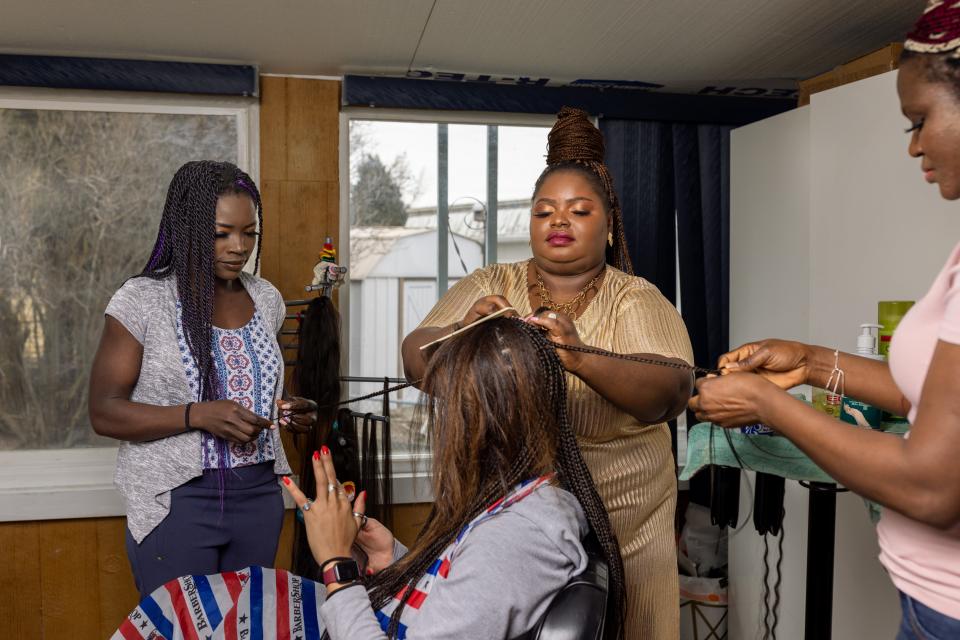Why force braiders into useless beauty schools? Expensive mandates pile onto student debt crisis.
Beauty school can cost up to $20,000, but African-style hair braider Tedy Okech skipped the expense. She learned the trade in her youth without formal training and now serves clients in Boise, Idaho, where she settled after immigrating from Uganda in 2005.
Policymakers should celebrate such entrepreneurship. Okech is one less person who would need a bailout if Congress or the White House were to move forward with student loan forgiveness.
Unfortunately, beauty professionals who operate without vocational school diplomas get treated like criminals. State regulators track them down and threaten them with fines and even jail time.
Threatening entrepreneurs with criminal prosecution
Essentially, self-made professionals who opt out of costly and often unnecessary programs get rounded up like truant schoolchildren and sent to class.
Counseling is speech: Moving to a new state shouldn't force you to say goodbye to your therapist
Arif Karowalia, a Pakistani immigrant who runs two eyebrow threading chains across the Midwest, recalls the day an inspector visited one of his Kansas shops and threatened unlicensed staff members with criminal prosecution. Karowalia says his employees – all master threaders – were left shaken and unable to earn income unless they enrolled in expensive programs that they neither needed nor wanted.
Kristy Béké, a West African immigrant from Benin, describes a similar experience in Charlotte, North Carolina, where she operates three hair braiding salons. Béké says a state inspector showed up one day and interrogated her for two hours, embarrassing her in front of clients before finally leaving without issuing a citation.
"You're trying to make an honest living by helping people and not relying on the government," Béké says. "But the state makes it hard. There's simply no reason for us to learn what we already know how to do."

The beauty profession is not alone.
►Pennsylvania, Vermont and Washington, D.C., have laws that require college for day care providers.
►Florida, Louisiana, Nevada and Washington, D.C. require college for interior designers.
►Georgia attempted to impose a college requirement on lactation consultants until our public interest law firm, the Institute for Justice, successfully persuaded a court to strike down the legislation this year.
Other examples exist, but state-mandated tuition is most common at vocational schools, especially in the beauty industry.
Honor Flights: A great way to thank veterans. But waitlist is long, time is short.
Some states have eased the burden on braiders, threaders, shampooers, hairstylists and makeup artists. Idaho, for example, passed a measure in March that will spare Okech the hassle – but it did so only after she and two other braiders sued the state with Institute for Justice representation. The reform is a step in the right direction, yet all 50 states and Washington, D.C., continue to mandate beauty school attendance or apprenticeships for cosmetologists and skin care specialists.
Needless tuition and student loans
The debate about student loan forgiveness often focuses on choice and accountability. All sides recognize the underlying problem: Colleges and universities often produce graduates with massive debt and limited job prospects. The sticking point is whether students who voluntarily pursue a college education deserve a bailout.
But beauty professionals do not have a choice, an issue policymakers on both sides of the aisle prefer to ignore. The needless tuition, mandated by the government, raises an important question: Should regulators push people – usually women – into school debt against their will just so they can work in low-wage jobs?
The Institute for Justice provided guidance in its 2021 report, "Beauty School Debt and Drop-Outs." The nationwide analysis shows that beauty schools offer a low return on investment. Earning potential after graduation fails to justify program costs, and many students quit before finishing because the quality of instruction falls below expectations.
She has been ridiculed: Amber Heard lost in the court of public opinion. Johnny Depp's fans made sure of that.
Elle Scheller says she witnessed harassment, intimidation, incompetence, overcrowding, graduation delays and hidden costs at the first beauty school she attended in Utah. She paid more than $16,000 before dropping out in January 2021 to escape an environment that she describes as hostile.
"It took a really big toll on my mental health," Scheller says. "There were just days when I would cry and have panic attacks before I went."
College students who enroll in comparative literature, art, journalism, history or science have options. Beauty professionals typically do not. State lawmakers rob them of choice and then stick them with the bill.
Renée Flaherty is an attorney and Daryl James is a writer at the Institute for Justice in Arlington, Virginia.
You can read diverse opinions from our Board of Contributors and other writers on the Opinion front page, on Twitter @usatodayopinion and in our daily Opinion newsletter. To respond to a column, submit a comment to letters@usatoday.com.
This article originally appeared on USA TODAY: Beauty school mandates tangle student debt debate

